Unless otherwise specified the following conditions apply: VIN = 13.5 V,
fSW = 400 kHz, L = 3.3 µH, CSENSE = 141 µF,
CPA_BUS = 1 µF, CPB_BUS = 1 µF, ILIM = GND,
TA = 25 °C.
Unless otherwise specified the following conditions apply: VIN = 13.5 V,
fSW = 400 kHz, L = 3.3 µH, CSENSE = 141 µF,
CPA_BUS = 1 µF, CPB_BUS = 1 µF, ILIM = GND,
TA = 25 °C.
| VSET = GND | fSW = 400
kHz | L = 3.3 uH |
 Figure 11-5 Load
Regulation
Figure 11-5 Load
Regulation
VSET =
VSENSE |
IPA_BUS = 0 A to 3 A |
IPB_BUS = 3
A |
fSW = 400
kHZ |
Figure 11-7 Load Transient Without
Cable Compensation
VSET =
VSENSE |
IPA_BUS =
0.75 A to 2.25 A |
IPB_BUS = 0
A |
fSW = 400
kHZ |
Figure 11-9 Load Transient Without
Cable Compensation
| VSET = GND |
IPB_BUS = 0.75 A to 2.25 A |
IPA_BUS = 0
A |
fSW = 400
kHZ |
Figure 11-11 Load Transient With Cable
Compensation
| VSET = GND |
IPA_BUS = 3
A |
IPB_BUS = 3
A |
fSW = 400 kHZ |
Figure 11-13 6-A Output Ripple
| VSET = GND |
IPA_BUS = 0
A |
IPB_BUS = 0
A |
fSW = 400 kHZ |
Figure 11-15 No Load Output
Ripple
| VIN = 13.5 V to 0 V |
PA_CC1 =
Rd |
IPA_BUS = 3
A |
Figure 11-17 Shutdown Relate to
VIN
| EN = 5 V to 0 V |
PB_CC1 =
Rd |
IPB_BUS = 3
A |
Figure 11-19 Shutdown Relate to
EN
| PA_CC1 = Rd to
Open |
PA_CC2 = Open |
IPA_BUS = 3
A |
Figure 11-21 Rd Desert Figure 11-23 Short Circuit
Recovery
Figure 11-23 Short Circuit
Recovery Figure 11-25 1-Ω Load Recovery
Figure 11-25 1-Ω Load Recovery Figure 11-27 PA_CC2 Hot Short to
GND
Figure 11-27 PA_CC2 Hot Short to
GND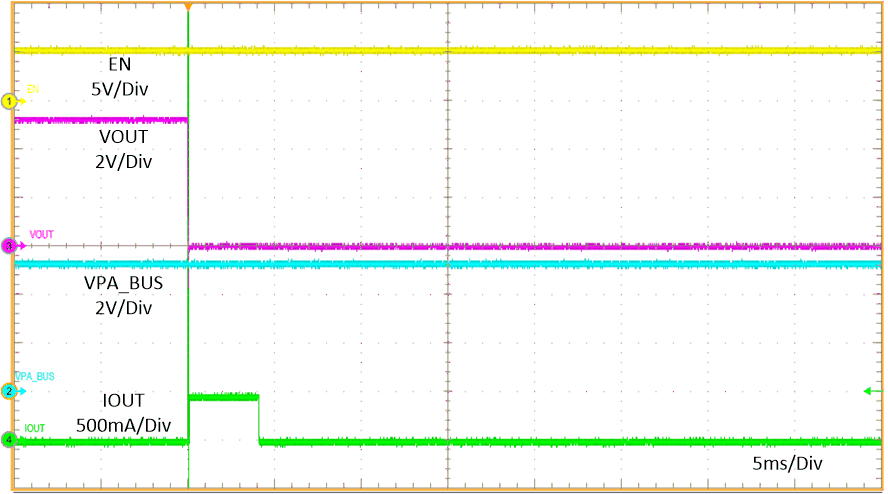
| PA_CC1 =
Rd |
OUT = GND |
PA/B_BUS NO LOAD |
Figure 11-29 OUT Hot Short to
GND
| VTS = 0 V to 4
V |
PA_CC1 =
Rd |
PA_CC2 = OPEN |
Figure 11-31 Thermal Sensing - NTC
Temperature HOT Behavior
| PA_BUS = 3A, PB_BUS =
3A |
fSW = 400
kHz |
L = 3.3 uH |
Figure 11-4 400-khz EMI Results
(Without CM Filter) Figure 11-6 Line
Regulation
Figure 11-6 Line
Regulation
VSET =
VSENSE |
IPB_BUS = 0 A to 3 A |
IPA_BUS = 3
A |
fSW = 400
kHZ |
Figure 11-8 Load Transient Without
Cable Compensation
| VSET = GND |
IPB_BUS = 0 A to 3 A |
IPA_BUS = 3 A |
fSW = 400 kHZ |
Figure 11-10 Load Transient With Cable
Compensation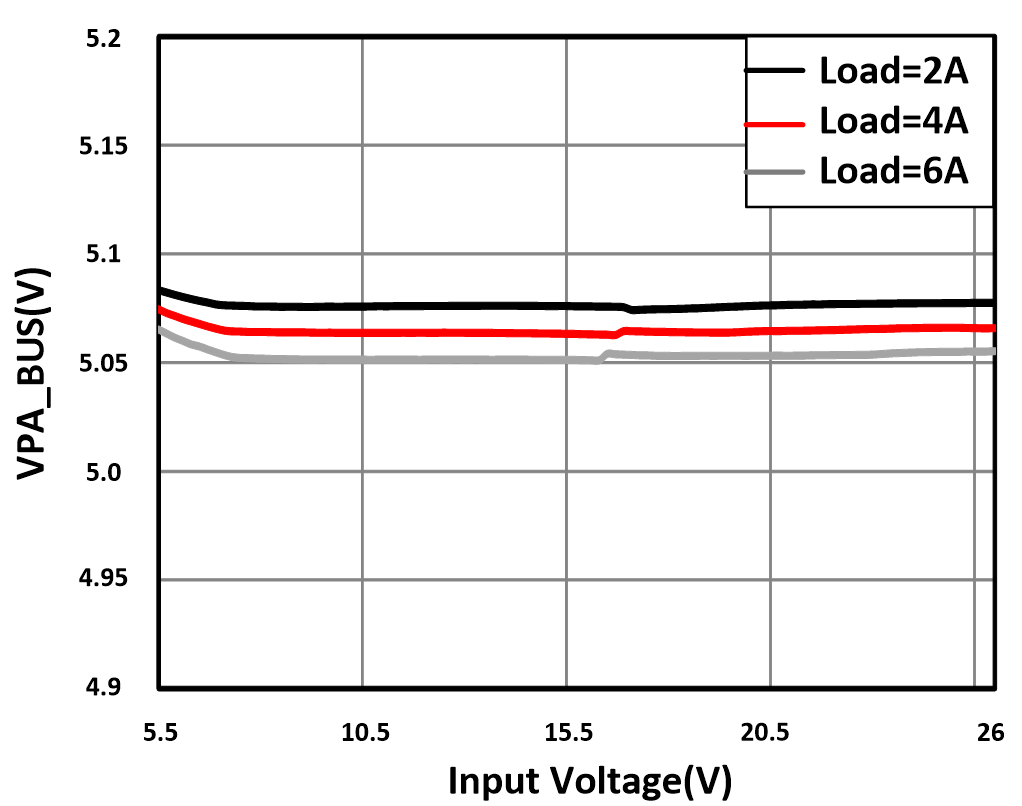 Figure 11-12 Dropout
Characteristic
Figure 11-12 Dropout
Characteristic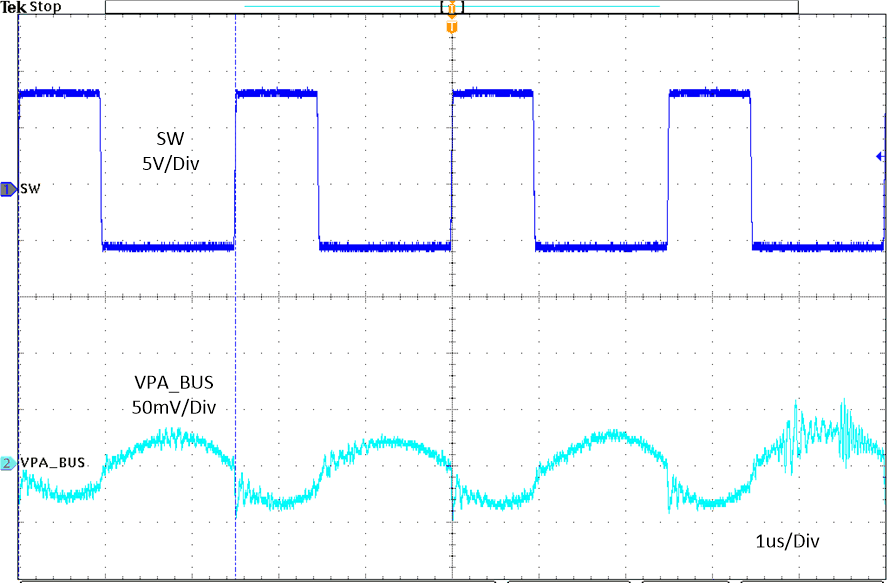
| VSET = GND |
IPA_BUS = 0.1
A |
IPB_BUS = 0
A |
fSW = 400 kHZ |
Figure 11-14 100-mA Output
Ripple
| VIN = 0 V to 13.5 V |
PA_CC1 =
Rd |
IPA_BUS = 3
A |
Figure 11-16 Startup Relate to
VIN
| EN = 0 V to 5 V |
PB_CC1 =
Rd |
IPB_BUS = 3
A |
Figure 11-18 Startup Relate to
EN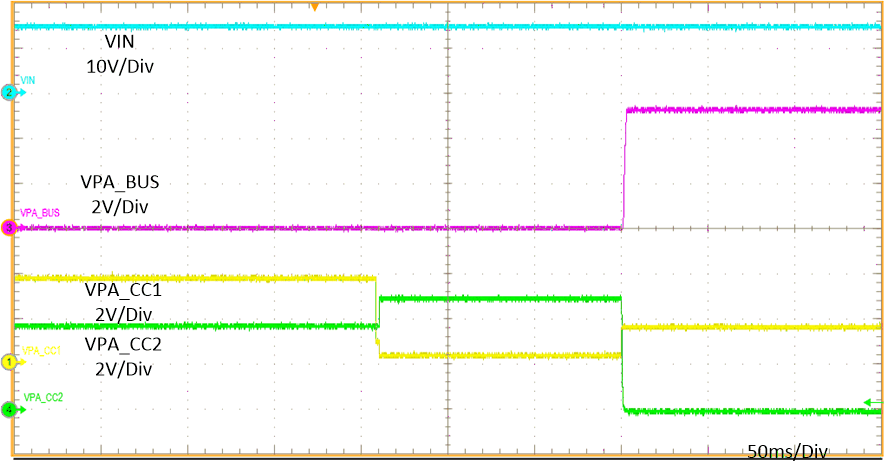
| PA_CC1 = Open to
Rd |
PA_CC2 = Open |
IPA_BUS = 3
A |
Figure 11-20 Rd Assert
| EN to High |
PA_BUS = GND |
PB_BUS = GND |
Figure 11-22 Enable Into Short
| EN to High |
PA_BUS = 1 Ω |
PB_BUS = 1 Ω |
Figure 11-24 Enable Into 1-Ω
Load Figure 11-26 VBUS Hot Short to
GND
Figure 11-26 VBUS Hot Short to
GND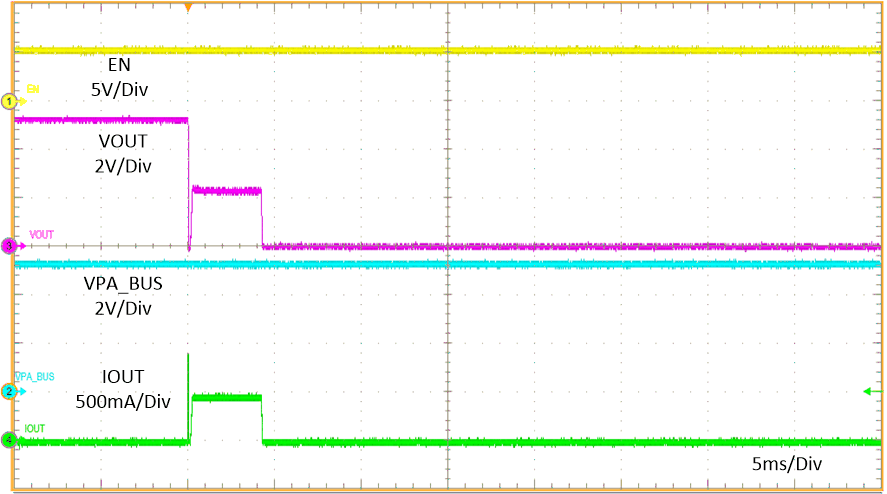
| PA_CC1 =
Rd |
OUT = 5.1 Ω |
PA/B_BUS NO LOAD |
Figure 11-28 OUT short to 5.1-Ω
Load
| VTS = 0 V to 2.6
V |
PA_CC1 =
Rd |
PA_CC2 = OPEN |
Figure 11-30 Thermal Sensing - NTC
Temperature WARM Behavior










 Figure 11-23 Short Circuit
Recovery
Figure 11-23 Short Circuit
Recovery Figure 11-25 1-Ω Load Recovery
Figure 11-25 1-Ω Load Recovery






 Figure 11-12 Dropout
Characteristic
Figure 11-12 Dropout
Characteristic





 Figure 11-26 VBUS Hot Short to
GND
Figure 11-26 VBUS Hot Short to
GND
